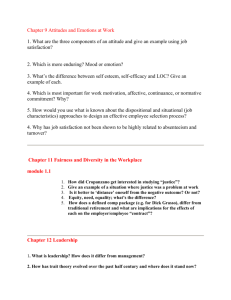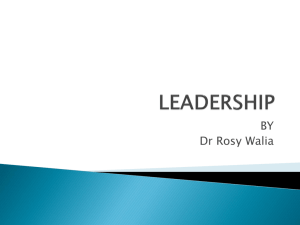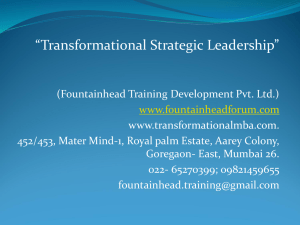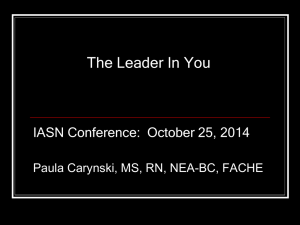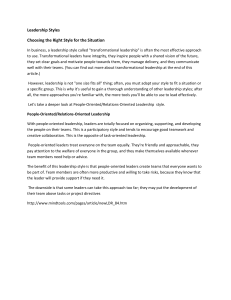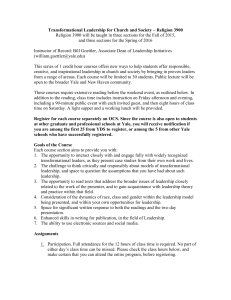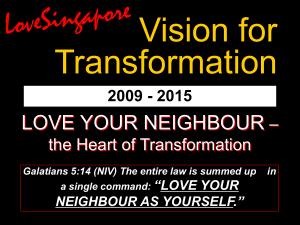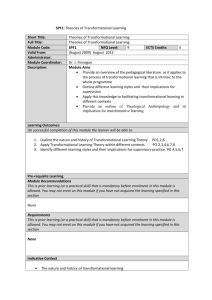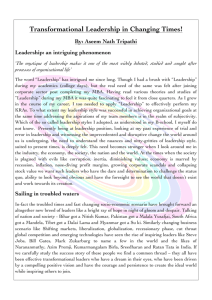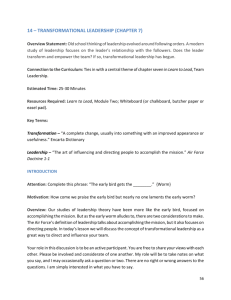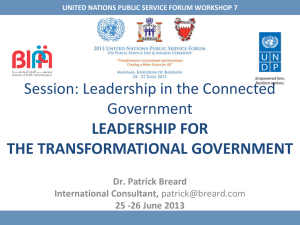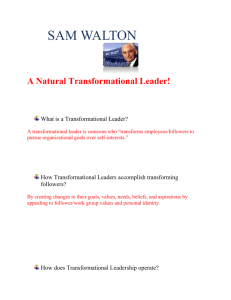Questions of Leadership
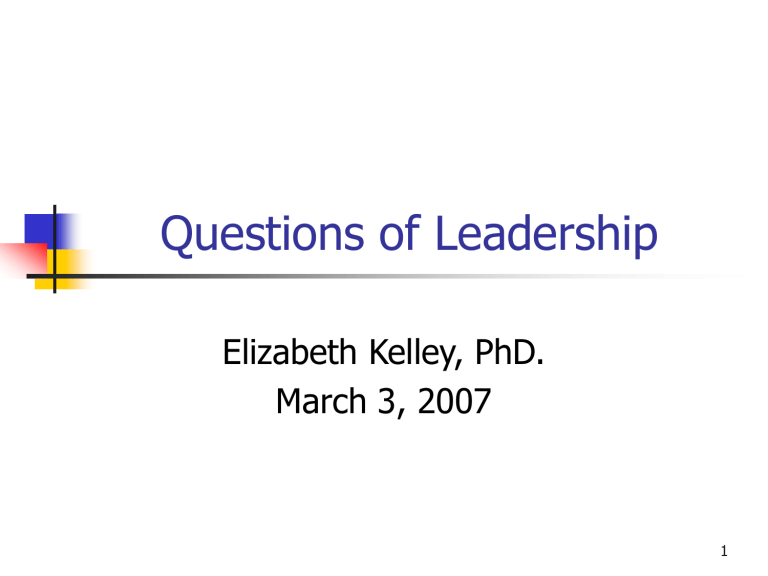
Questions of Leadership
Elizabeth Kelley, PhD.
March 3, 2007
1
Questions of Leadership
2
3
#
1
4
5
Question
What is leadership?
Is leadership important?
How do management and leadership differ?
Are leaders born or made?
What do leaders do?
6 How do you lead effectively in emerging environments?
7A & B Why transformational leadership?
What IS transformational leadership?
8 What kind of leadership will organizations need in the future?
2
Effective Leaders
3
Elizabeth 1
4
Gandhi
5
Winston Churchill
6
Oprah
7
Louise Arbour
8
Ordinary Guy
9
Norman Horrocks, OC
10
Question #1
What IS Leadership?
11
Various Definitions
Leadership is the process by which a person exerts influence over other people and inspires, motivates, and directs their activities to help achieve group or organizational goals .
(McShane, 2000)
To take people to places they would not have gone, and have them do things they would not have done…. Because it is their own idea!
(Kelloway, 2004)
Leadership is an intangible quality with no definition. That’s probably a good thing, because if the people being led knew the definition, they would hunt down the leaders and kill them.
(Scott Adams,
2000)
12
Question #2
Is Leadership Important?
13
It Depends on Who You Ask
Implicit Leadership Perspective
Leadership Substitutes
YES!!!
complex, changing environment lateral leadership requirement employee retention
14
Question #3
How Do Management and
Leadership Differ?
15
Various perspectives
Management is doing something right; leadership is doing the right thing
Management deals with systems and structures; leadership deals with people and ideas
Managers control complexity; leaders initiate change
16
Question #4
Are Leaders Born or Made?
GREAT MAN STUDIES
17
Leadership Competencies
1.
2.
3.
4.
5.
Drive
Leadership motivation
Integrity
Self-confidence
Intelligence
6.
7.
8.
9.
Knowledge of the business
Emotional intelligence
Tolerance to
Stress
HEIGHT
18
Leadership Competencies
Indicate potential, not performance
Perceptions
Chicken or egg?
Universality bias
19
Question #5
What Do Leaders Do?
20
Behavioural Studies
Two independent behavioural dimensions: people-oriented and task-oriented
Results in four styles of leadership
People-oriented – satisfied employees
Task-oriented – inconclusive
Universality bias
21
Context Bias in Theory
How does context influence management thought?
Cold War climate – Leadership theory connection
22
Contingency Approach
IT DEPENDS!!!
Focus on relationship between leader and follower
Different styles for different situations
Transactional – focus on results, getting job done
23
Emerging Organizational
Environments
Issues:
Information – access, control, usage, privacy, security, technology
Distance – remote workers, customers, suppliers
Diversity – generational, cultural, gender, ability
Corporate social and environmental responsibility
Integrity
CHANGE
24
Question #6
How to Lead Effectively in
These Environments?
25
Transformational Leadership
Aim is to elevate followers to higher levels of performance (Burns and Bass)
Also called “full range leadership” and/or “authentic leadership”
Focuses on leader-follower relationship
Incremental to transactional leadership
26
Question #7A
Why Transformational Leadership?
It works
unequivocal support in a variety of environments
(Judge & Piccolo) increased employee job satisfaction, organizational commitment, retention, information sharing, innovation, individual and unit bottom line performance
It can be taught
improved organizational and individual performance after training
(Barling, Weber &
Kelloway)
27
Question #7B
What specifically IS it?
Idealized influence – Leader engenders faith, trust and respect by consistently doing the right thing
Inspirational motivation – Leader sets high standards, presents a vision, convinces individuals they can perform beyond expectations; consistent actions cultivate trust
Intellectual stimulation – Leader encourages followers to think for themselves, develops future leaders
Individualized consideration – Leader treats each employee as an individual, focuses on employee development, demonstrates compassion
28
Ways to Enact TFL
Idealized influence – make decisions transparent; give the decision and its rationale
Inspirational motivation – talk positively, express confidence in others; use the self-fulfilling prophecy – “I know you can do it”
Intellectual stimulation – ask “What if?”, “What do you think we should do?”; STOP answering questions
Individualized consideration – make time for others as individuals, MBWA, assign tasks on the basis of individual abilities and developmental needs
RRSP MODEL
29
Transformational Stories
Ordinary Guy
Stacey, the teacher
Jack Welch…not?
30
Question #8
What kind of leadership will organizations need in the future?
31
Future Leadership Style
Helping others succeed
Flexible
Collaborative
Inclusive
Participative
Relationship-oriented
Encourage knowledge sharing and creation
Encourage innovation
TRANSFORMATIONAL LEADERSHIP
32
Leadership in Other Emerging
Contexts
Remote leadership
Knowledge-based organizations
Multi-generation workforces
Cross cultural workforces
Social/environmentally conscious organizations
33
Nothing New Under the Sun?
To lead people, walk beside them.
As for the BEST leaders, the people do not notice their existence. The Next
Best, the people honor and praise. The
NEXT, the people fear; and the NEXT, they hate.
When the BEST leader's work is done the people say, "We did it ourselves".
Lao Tzu
34
Questions of Leadership…and some suggested answers
1
# Question
What is leadership?
Answer
Influence, inspire, your choice
2
3
4
5
Is leadership important?
How do management and leadership differ?
Are leaders born or made?
What do leaders do?
Yes, very (but not everyone agrees)
They are two ends of a continuum of full range leadership; both required
Yes; you can learn to be transformational; some do it naturally
It depends on who/when you ask – people and task;
Transformational Leadership 6 How do you lead effectively in emerging environments?
7A Why transformational leadership?
It works and it can be taught
7B What IS transformational leadership?
A leadership style that aims to elevate performance beyond expectations: ask questions, empower, role model, articulate a vision and are CONSISTENT
8 What kind of leadership will organizations need in the future?
Transformational leadership
35
